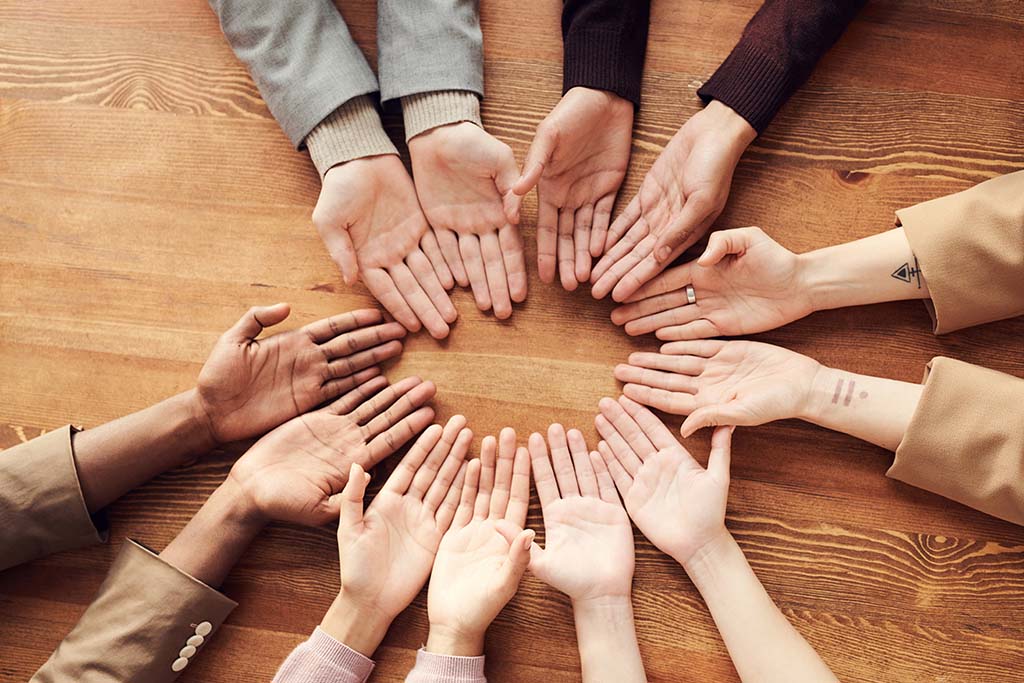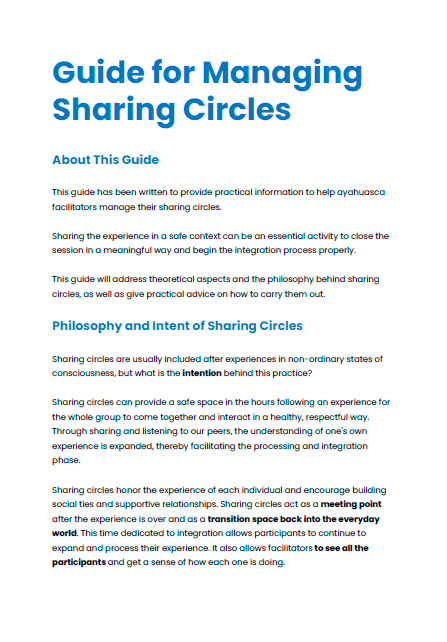ICEERS | 9 February 2024
“Through this shared experience, the feeling of community is reinforced, and the experiences themselves are put into context and perspective, often realizing that our experiences are not as unique as we might have imagined… Other people’s stories can clarify confusing aspects of our own experience for which we perhaps haven’t found an adequate expression.” — Marc Aixalà in Psychedelic Integration.
Plant medicine can offer a profound journey into the depths of consciousness. These explorations offer insights and transformative experiences that can be both enlightening and challenging. Sometimes a supportive, structured environment post-experience can help integrate these lessons into daily life. Group sharing circles after a psychedelic experience can be a tool to help facilitate this process. The primary goal of sharing circles is not to recount the psychedelic experience in detail, but rather to describe the most meaningful aspects.
These circles serve as a safe environment where people can articulate their psychedelic experiences, gain clarity, find solidarity with others who have been on similar journeys, and learn from other people’s experiences. Below are details of the purpose and benefits of sharing circles, emphasizing their role in community building, enhancing self-reflection, and supporting the integration process. This information is offered to guide both facilitators and participants with a foundational understanding of how sharing circles after a psychedelic experience can be utilized as a tool for healing and personal growth. This information is gleaned from the modules of the ICEERS Academy courses and the book Psychedelic Integration: Psychotherapy for Non-Ordinary States of Consciousness by Marc Aixalà.
Sharing Circle Framework
Sharing circles after a psychedelic experience involve being in a supportive and non-judgmental group setting, where participants take turns sharing their personal experiences without reconveying the experience in great detail. Instead, the focus is put on conveying the most important points of their journey and then listening attentively to others. This process encourages participants to verbalize their thoughts, emotions, and insights. This in turn enables them to make sense of their experiences and potentially reduce their intensity.
Sharing circles foster a sense of community and understanding, as participants are able to connect over common themes and challenges encountered during their psychedelic journeys. During a session, one person at a time is given the space to share for a set length of time. The process involves no feedback, interpretations, or questions from other members of the group. This ensures that the space remains safe for self-expression. These groups are in no way group therapy sessions and typically have a decentralized approach in their formation and organization.
Sharing circles emphasize the importance of the participant’s experience over the workshop or facilitator’s role. These spaces foster a sense of community, as participants often find common ground in each other’s stories which helps them gain clarity and perspective on their own experiences.
These types of groups can be counterproductive for people who are shy, have felt shame in their experiences, do not feel comfortable in groups, or come from cultures where it is not customary to share private matters in public. It is also important to calibrate and check in with yourself to that you are not feeling group pressure to expose yourself.
Verbalizing the Experience: Making Sense Through Words
The process of putting these experiences into words can help participants make sense of their situation. In addition, the act of verbalizing these experiences may decrease their intensity, making them more manageable and digestible. It’s normal for individuals to initially struggle to articulate their experiences. In such instances, sharing circles accommodate expressing current emotional states without delving into specific details. This supportive environment aids in the acceptance and integration of the psychedelic experience.
After a plant medicine workshop or ceremony, providing a space for an ongoing dialog about the topics that came up during the experience is crucial. Such environments should center on open, respectful sharing without interruptions or analysis. The benefits of sharing about psychedelic experiences occur when there is an appropriate audience and context, which helps to nurture a supportive and trusting environment.
Variations in Sharing Circles: Flexible Dynamics
Sharing circles vary in their implementation and facilitation. Sometimes are organized by therapists or facilitators a few days after a psychedelic experience. They can also take the form of independent groups that offer the opportunity to come together and process after a psychedelic experience. These circles can be led by therapists with active interventions or can be more horizontally structured with minimal input. The dynamics can include dialogue, active listening without comments, or other integration activities.
These circles can also involve 1-on-1 sharing. Participants are paired up with one another. One person shares their experience for a fixed amount of time, while the other listens and then summarizes what they’ve heard. This technique helps distill the essence of the experience into a concise narrative.
Conclusion
Sharing circles after a psychedelic experience offer a space for reflection, mutual support, and a deeper understanding of the participants’ situation. Sharing circles are vital for those seeking to process their psychedelic experiences in a community setting. Done right, they can significantly enhance the overall integration of the insights gained from the psychedelic journey.
The following PDF companion serves as a concise reference guide for those interested in attending or starting sharing circles after psychedelic experiences. The PDF is part of a collection of resources from the ICEERS Academy course Increasing the Safety of Ayahuasca Sessions: A Harm Reduction Course for Facilitators in Non-traditional Contexts. For more information on sharing circles and the integration process, check out the ICEERS Integration Course and the book Psychedelic Integration by Marc Aixalà.
Photo by fauxels from Pexels: https://www.pexels.com/photo/photo-of-people-s-hand-on-top-of-wooden-table-3184397/
PDF Resource
Guide for Managing
Sharing Circles
Get the PDF guide for those interested in attending or starting sharing circles after psychedelic experiences.
Categories:
NEWS
Tags:
psychedelics
, integration
, psychedelic integration
, psychotherapeutic processes


